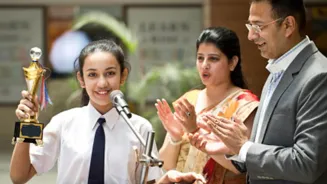In a world where artificial intelligence can generate answers in seconds, the ability to question, argue, and think independently is emerging as a defining skill for students. Across Indian classrooms,
debating, once reserved for a few annual competitions or select school teams, is gaining new ground. Teachers and principals are recognising that debate is no longer just a performance art, but an essential tool to nurture critical thinking, communication, and originality of thought in the age of AI.
Instead of being confined to occasional contests or limited school circuits, debating is now being shaped into more structured platforms. Schools are introducing regular debating programmes, and new initiatives ranging from inter-school leagues to international bootcamps are opening doors for students from diverse backgrounds. One such effort, the Indian Debating League (IDL), has widened access, reaching 1,050 schools across 111 cities, and giving children from varied boards and regions the chance to practise reasoning, evidence-based argument, and empathy, often in dialogue with peers across the globe.
Anjali Tiwary, Founder of the Indian Debating League (IDL), said the need for this change is clear with newer professions coming up. Over the past few years, IDL has simplified the format to make debating less intimidating and more accessible for students. That shift has not only expanded participation but also helped Indian teams record 35 wins at international tournaments.
“This is not a hobby to speak well. You have to speak well. 40% children are going to be gig workers tomorrow. They will need to create their own brands. In a world where everyone has access to the same information through tools like ChatGPT, what will set you apart is originality of thought and the ability to articulate it. They will need non-negotiable skills to solve modern-day challenges,” Anjali explains.
ALSO READ: QS MBA Rankings 2026: These 3 Indian Business Schools Made It To The Top 100
Principals are beginning to see the same urgency. Raman Bajaj, CEO of Heritage Xperiential Schools, notes that sustained debating initiatives have brought an exceptional depth of training to students.
“Indian students are now excelling at prestigious international tournaments. What’s most inspiring is how debate has evolved into a true mind sport in our schools, with students participating month after month in tournaments on themes from sustainability to ethics to AI. This is far more than skill-building; it’s identity-shaping,” Raman said.
For Anjali, this reflects her belief that debating has to move from being a performance for the few to a practice for the many. “Curiosity is natural, but our classrooms don’t always leave space for it,” she said.
“Children want to ask questions, but teachers are under pressure to finish portions. Debating provides a structured way for students to ask those questions, reason through ideas, and voice them with clarity,” she added.
For students, the impact is personal and immediate. Norra Chhatwal, a Grade 9 student from Vasant Valley School, describes her journey as “truly transformative.”
“I started at a young age, and it gave me not only confidence but also direction. Debating has taught me how to think on my feet, organise my thoughts, and collaborate effectively with others,” Norra said.
Her participation has taken her from Delhi classrooms to international arenas like Princeton and Columbia.
“Debating pushes you to see every issue from multiple perspectives. You learn that forming an opinion is not enough; you must support it with logic and communicate it clearly and persuasively. These are essential skills for students today, helping us think critically and express ourselves confidently,” she added.
Educators agree that debating is no longer a side activity but a core practice for student growth. Gaurav Bedi, Principal of Gurukul The School, has seen this shift firsthand.
“Students eagerly look forward to the sessions and have grown across debating formats, from parliamentary to World Schools. The real impact is visible as it challenges students to think critically, articulate clearly, and express themselves with confidence,” Gaurav said.
What is clear is that debating in India is no longer confined to the sidelines of school life. With growing institutional support and a range of inter-school and international platforms, it is evolving into a core learning space that prepares young people not just to speak, but to think, question, and lead. In a country where education often rewards silence, debating may be teaching the most radical skill of all: to speak up.












